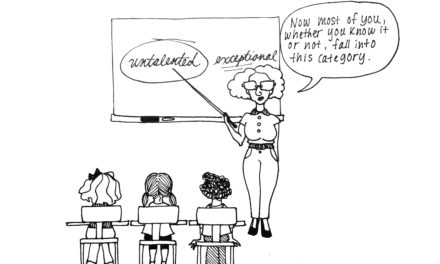
Revesq/Wikimedia Commons
Content Warning: This article contains references to sexual assault.
“We welcome a diversity of gender identities, sexual orientations, abilities, and disabilities, as well as racial, ethnic, cultural, socioeconomic, religious, national, and international backgrounds, believing that the academic and social energy that results from such diversity is essential to advancing knowledge, addressing society’s most pressing issues, and attending to the full spectrum of human needs in service to the common good.”
The above clause is Emory University’s Institutional Statement on Diversity. It guides all departments, faculty, staff and students on what Emory expects of its community; however, it is unclear what steps the University is taking to ensure everyone on Emory’s campus is practicing these ideals. Well, nearly all first-year students are required to complete mandatory first-year orientation. During this orientation, Orientation Leaders (OLs) were previously instructed to participate in a diversity skit. This skit emphasized differences between students by having the OLs say the line “I knew I was different when __.” Students would say fill-in-the-blanks like “people made fun of the food I ate,” “others were shocked that I was able to speak ‘proper English,’” “I was raped” and “I was gay.” At the end of the skit, the group of students spoke about how they were able to find community at Emory despite these “differences.” It was a very kumbaya moment.
This skit was the last of a queue of different skits, which included limericks about doing work while in college or navigating roommate troubles. Following these jokes with a very serious thematic skit was a jarring change. In fact, it fails to teach incoming students to be curious about their peers’ diversity. If the skit was teaching students, then it would instruct them to ask questions in an appropriate way by providing resources and exposure. It would also accentuate the beauty of what makes people diverse instead of having them ostracize themselves on a stage.
Faith Mason (26C) was the first to tell the Orientation Experience staff about her issues with the skit before the first-years arrived.
Mason was surprised that the diversity skit was a part of Emory’s orientation program. She believes that first-year orientation needs to discuss diversity and inclusion, but a “spectacle was being made” with the current curriculum.
The Student Involvement, Leadership, and Transitions (SILT) office instructed OLs to perform the skit as part of the diversity curriculum for orientation training. However, it only alienates and otherizes essential characteristics and experiences of people’s identities. By having OLs tokenize their identities, they objectify themselves. This is not to say that OLs should not take pride in these identities or acknowledge their past, but emphasizing diversity through a skit makes people’s unique characteristics seem performative. Tokenizing identities is not truly acknowledging the uniqueness of an individual, and it certainly is not valuing them for the qualities they possess. It is only putting OLs on a pedestal, temporarily, in an attempt to further another agenda. In this case, OLs were asked to identify the things that make them “unique” in an attempt to advance the University’s bragging point of diversity. Even worse, the conclusion of the skit was that once you arrived at Emory, none of these alienations happened anymore, and if they did — on rare occasions — the University would completely reprimand the abuser. This is far from the case. Those of us who have been on campus know this is simply an idealized reality, not the truth. The way to model an inclusive environment is not to make a skit about transgressions people face every day.
Thankfully, the SILT staff listened to the concerns of the OLs and immediately cut the skit from this year’s orientation schedule. Associate Director of Orientation and Transition Programs Carson Banks said he was “proud of our students for providing feedback and suggestions regarding orientation skits related to Emory’s community standards.” I speak on behalf of the other OLs when I say we are profusely thankful that the SILT staff listened and changed the curriculum based on the voices of students. I hope the SILT staff shares what they have learned from this year’s group of students with all student life departments. First, other Emory departments should note how quickly SILT staff addressed the situation, and they should model their own actions based on this. Second, departments should teach students how to be curious about the diversity of the people around them.
While it is encouraging to know that the University knows that diversity should be discussed, skits are not the right way to do so. Mason noted that there “needs to be wider variation and diversity within the rooms where these decisions are being made.”
According to Banks, there may be official changes to the diversity curriculum for the 2024 orientation training year. The SILT staff meets throughout the late fall and early spring to review orientation content and curriculum. SILT is currently unable to comment on what new ideas they are discussing, but they are open to having student leaders, such as Student Coordinators, in the room for these conversations to help craft the diversity curriculum from a student perspective.
“[The SILT Staff] truly did hear me out,” Mason said. Rather than skits, some OLs suggested having an open panel with club leaders or a conversation with administration on diversity and inclusion. By having campus leaders show what behavior first-years should mirror in everyday interactions, they will understand what Emory expects of them.
The goal of the diversity curriculum should not be to have the University pat itself on the back for admitting students from diverse backgrounds. It should be teaching first-year students how to interact with those who are different from them, how to ask questions in a respectful manner, how to be compassionate to those who have different life experiences, how to use inclusive language and how to speak up when someone is being offensive. From my experiences, not all incoming students know the best way to engage in sensitive conversations. In fact, I am still learning how to be compassionately curious. It is safe to assume that the majority of first-years do not want to be offensive to their newfound peers. However, without proper exposure and practice, it is reasonable to assume offensive behavior will transpire. It is the University’s job to make sure it is giving students the skills to ask questions about those who are different from themselves in an appropriate manner. Emory should encourage students to be lifelong learners, especially when it comes to the diverse variety of people they are going to be surrounded by for the remainder of their lives.
The inclusivity of diverse communities is not a skit, and it does not deserve to be treated as one.
If you or someone you know experienced sexual assault, you can access Emory’s Department of Title IX at 404-727-0541 and the Office of Respect’s hotline 24/7 at (470) 270-5360. You can reach the RAINN National Sexual Assault hotline 24/7 at (800) 656-4673. You can reach the Atlanta Grady Rape Crisis Center crisis hotline 24/7 at (404) 616-4861 and the Decatur Day League Sexual Assault Care and Prevention crisis hotline 24/7 at (404) 377-1428.
Lola McGuire (26C) is from Nashville, TN.
##
If you or someone you know experienced sexual assault, you can access Emory’s Title IX resources at 404-727-0541 or https://equityandcompliance.emory.edu/title-ix/index.html and the Office of Respect at https://respect.emory.edu/ or their hotline 24/7 at (470) 270-5360. You can reach the RAINN National Sexual Assault hotline 24/7 at (800) 656-4673 or https://hotline.rainn.org/online. You can reach the Atlanta Grady Rape Crisis Center crisis hotline 24/7 at (404) 616-4861 or gradyrapecrisiscenter@gmh.edu and the Decatur Day League Sexual Assault Care and Prevention crisis hotline 24/7 at (404) 377-1428.
Lola McGuire (she/her, 26C) is from Nashville, Tennessee majoring in Political Science and minoring in English on the pre-law track. Outside of the Wheel, Lola is the Social Justice Coordinator for Emory Democrats, an Intern with the local Georgia government, tutor for Emory Reads, and nanny for three sweet boys. In her free time you can find her basking in the sun, drinking coffee, listening to Billy Joel, or thrifting with friends.




